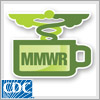A CUP OF HEALTH WITH CDC
Good Medicine Can Be Bad for Baby
National Birth Defects Prevention Month — January 2011
Recorded: January 13, 2011; posted: January 14, 2011
[Announcer] This podcast is presented by the Centers for Disease Control and Prevention. CDC — safer, healthier people.
[Dr. Gaynes] Welcome to A Cup of Health with CDC, a weekly feature of the MMWR, the Morbidity and Mortality Weekly Report. I’m your host, Dr. Robert Gaynes.
Advancements in medications have helped improve the lives of millions of people. However, some medicines that are used to treat a woman’s medical conditions can have adverse effects on her unborn child.
Dr. Cheryl Broussard is an epidemiologist with CDC’s National Center on Birth Defects and Developmental Disabilities. She’s joining us today to discuss the potential link between birth defects and women taking medications during pregnancy. Welcome to the show, Cheryl.
[Dr. Broussard] Thank you.
[Dr. Gaynes] Cheryl, are birth defects among newborns increasing or decreasing?
[Dr. Broussard] Overall, the percentage of birth defects has remained relatively stable at about three percent and birth defects are a leading cause of infant death in the United States. We’ve seen some changes over the past decade within birth defect categories, so, for instance, we’ve seen a decrease in neural tube defects with an increase intake of folic acid in the population. But, overall, the prevalence has remained stable.
[Dr. Gaynes] How common is medication used with pregnant women?
[Dr. Broussard] We know that approximately two thirds of women use at least one medication during their pregnancy, so medication use is quite common and it’s something that we can change during pregnancy that could potentially influence the pregnancy outcome.
[Dr. Gaynes] What kinds of medicines can lead to birth defects?
[Dr. Broussard] Outside of a few known associations, we really don’t have enough information about the safety of medications when they’re taken by pregnant women. We do know that taking some medications, such as thalidomide, isotretinoin or Accutane during pregnancy may cause serious birth defects in the baby and these medications should be avoided by all pregnant women. Because of this, there are actually systems in place to prevent pregnancy in women who must take these medications.
[Dr. Gaynes] Do prescription drugs carry a greater risk than over-the-counter medications?
[Dr. Broussard] Prescription, over-the-counter, herbal, and dietary products – none of these medicines are tested in pregnant women, so we can’t say that one is either more or less risky than the others. And for herbal and dietary products, these are marketed without any testing through clinical trials to demonstrate either safety or if they’re effective for what they’re supposed to do. So, in contrast to the prescription and over-the-counter medications, herbals and dietary products go through a different process of being regulated by the FDA and there have been some safety concerns related to these products over the years. So just because a product is labeled natural doesn’t mean it’s necessarily safe for either the woman or her unborn baby.
[Dr. Gaynes] Cheryl, can medications taken by a woman before she becomes pregnant still have an effect on her unborn child?
[Dr. Broussard] Yes. Medications taken just before pregnancy or before a woman recognizes that she’s pregnant can impact her risk for having a baby with birth defects, so it’s very important that women talk with their doctors and health care providers about the risks and benefits of taking prescription, over-the-counter, and herbal medications before getting pregnant, during pregnancy, also while breastfeeding and in between pregnancies. And we recognize that some pregnant women really must take medications to treat health conditions, like asthma and epilepsy, high blood pressure, depression, and others, and if these conditions are not treated, a pregnant women and her unborn baby could be harmed, so we recommend that women not stop or start taking any medications without first talking with a health care provider.
[Dr. Gaynes] Where can listeners get more information about women taking medications during pregnancy?
[Dr. Broussard] For more information about medication during pregnancy, listeners can visit www.cdc.gov/pregnancy.
[Dr. Gaynes] Thanks Cheryl. I’ve been talking today with CDC’s Dr. Cheryl Broussard about the link between birth defects and women taking medications during pregnancy.
Nearly two thirds of women use at least one medication during pregnancy. If you or someone you know is pregnant or about to become pregnant, consult with a health care provider about the risk for using a particular medication during pregnancy.
Until next time, be well. This is Dr. Robert Gaynes for A Cup of Health with CDC.
[Announcer] For the most accurate health information, visit www.cdc.gov or call 1-800-CDC-INFO, 24/7.



